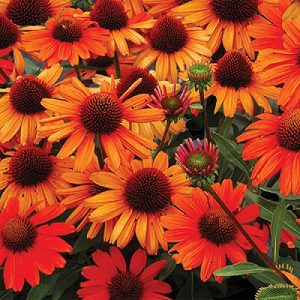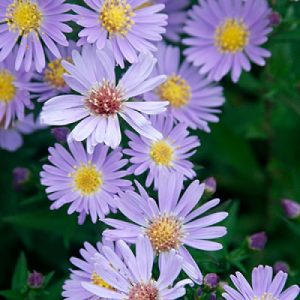
Aster Wood’s Blue
Clear lavender-blue flowers appear in late summer through fall over clean, compact, dark green foliage. Perfect for sunny borders or containers, this beauty looks good all season and displays great mildew resistance! ‘Wood’s Blue’ prefers consistently moist, well-drained soil. Rejoice, me hearties–it’s maritime tolerant.
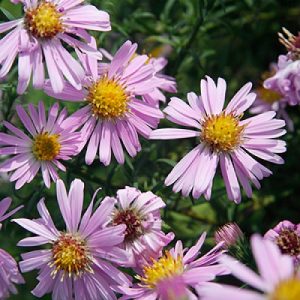
Aster Wood’s Pink
Bright light pink flowers glow over clean, compact, dark green foliage. Blooming in late summer through fall, this stunner is great for sunny borders or containers–it looks good all season. Exhibiting superior mildew resistance, ‘Wood’s Pink’ prefers consistently moist, well-drained soil. Yo-ho!–it’s maritime tolerant.
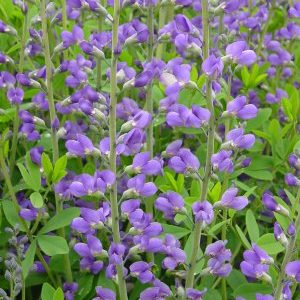
Baptisia australis – Blue False Indigo
Wild Indigo Duskywing / Eastern Tailed-Blue / Orange Sulphur / Clouded Sulphur / Frosted Elfin / Hoary Edge
Blue spikes of pea-shaped flowers resemble the tall racemes of lupines in May and early June. A slow to mature, but very rewarding native garden perennial. Found in open woods, river banks and sandy floodplains, New York to Nebraska to Georgia.
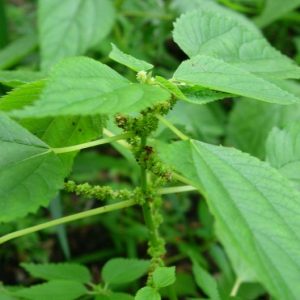
Boehmeria cylindrica – False Nettle
Host Plant – Red Admiral, Eastern Comma, Question Mark Preferring wet-mesic and semi-shady sites, Boehmeria cylindrica lacks the stinging hairs of some of its nettle cousins. Stringy heads of tiny yellow-green flowers form between leaf stems in summer. Moths and butterflies are attracted to this modest plant.
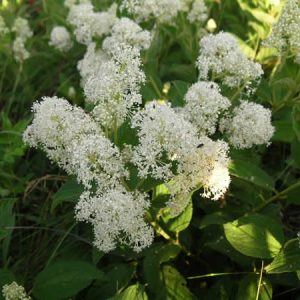
Ceanothus americanus – New Jersey Tea
Host Plant – Eastern Tailed Blue / Spring Azure / Summer Azure
A deciduous shrub that grows just 3′ tall, the dried leaves of New Jersey Tea make a flavorful tea that was popular during the Revolutionary War. This extremely adaptable species can withstand inhospitable conditions because of massive, deep roots.
The white flower poms are attractive to butterflies, hummingbirds and pollinators.
New Jersey Tea is excellent as a shrub border and a is a fabulous addition for native plant gardens. It is also effective as a shrubby ground cover for hard-to-grow areas such as dry rocky slopes and banks. Easily grown in average, dry to medium, well-drained soils in full sun to part shade. Best in sandy loams or rocky soils with good drainage. Thick, woody, red roots go deep and help plant withstand droughty conditions, but make established shrubs difficult to transplant.
Grown in one quart pot with approximately 6” of top growth.
Plants grown without harmful pesticides and are safe for butterfly gardens.
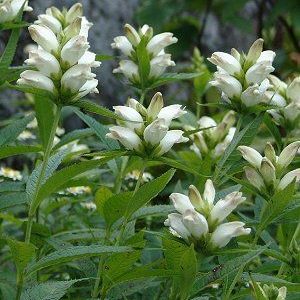
Chelone glabra – White Turtlehead
Host Plant – Baltimore Checkerspot
Spikes of elegant white flowers top shiny green foliage in late summer and early fall. Grows best in moist meadows, stream banks, and swamps. Favorite breeding site for the Baltimore Checkerspot Butterfly.
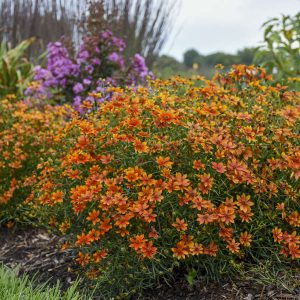
Coreopsis verticillata ‘Crazy Cayenne’
Common Name: Threadleaf Coreopsis Go crazy for this vibrant orange Coreopsis that has a perfectly domed, rounded, uniform habit. 1¾” wide, fiery sunset orange flowers have intense red-orange color concentrated at the centers of the petals. The undersides of … Read More
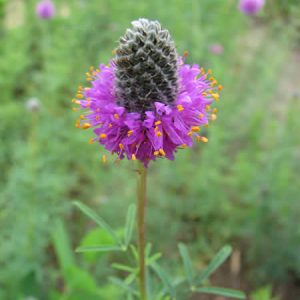
Dalea purpurea – Purple Prairie Clover
Host Plant – Sulphurs
Tiny rose-purple flowers in cylindrical, head-like masses at ends of upright wiry stems.
This is one of the most widespread of the perennial Prairie Clovers, identifiable by their cone-like flower heads. An excellent range species, with high protein content, Purple Prairie Clover decreases in abundance with overgrazing. A midwestern white-flowering species, White Prairie Clover has elongated flower heads and is only 2 (60 cm) tall. A white-flowering southeastern coastal plain species, D. carnea var. albida, has conspicuous green bracts within the heads.
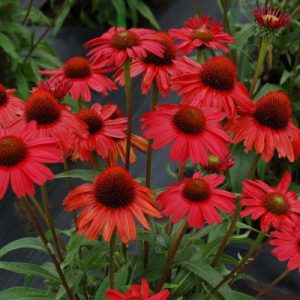
Echinacea – Kismet Red
Numerous intense red flowers bloom for weeks on an upright, compact habit. Perfect for mixed beds or borders.
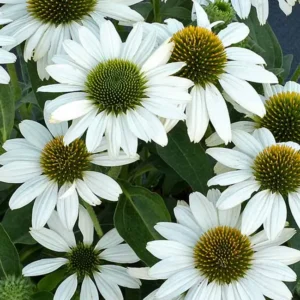
Echinacea – Kismet White
Numerous intense white flowers bloom for weeks on an upright, compact habit. Perfect for mixed beds or borders.
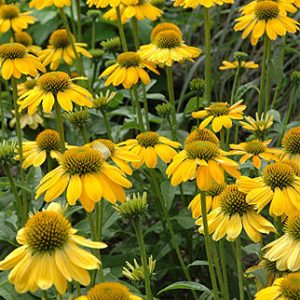
Echinacea Sombrero – Lemon Yellow Coneflower
Sunny, lemon yellow blooms sure to brighten a summer border! A must-have for a cutting garden, this drought tolerant perennial was bred for cold hardiness and compact form with prolific flowering over an exceptionally long season. Keep dried flower heads on the plants in the fall for winter interest. An herbaceous perennial.

